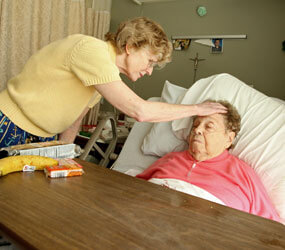TIMONIUM – Many dementia patients can’t remember the names of their children or what they did the previous day. Long after they have lost the capacity to formulate a sentence, however, their spiritual memories often remain vibrant and alive.
“Folks that appear to be asleep, or not engaged or focused, when they begin to hear a familiar prayer like ‘Our Father’ or the rosary, they’ve got every word and are right there with you,” said Father Lawrence Johnson, director of pastoral services at Stella Maris in Timonium, a long-term care facility that includes dementia units.
Through a pastoral care program, Stella Maris leaders help patients with dementia reconnect with their spiritual selves, using spiritual rituals as memory triggers.
“We are mind, body and spirit,” said Susan Anderson, a Stella Maris chaplain. “The spiritual part of us doesn’t die, it is always there and needs nurturing. It has its own history and recognition of rituals.”
Anderson noted that people need to have their spirituality recognized and valued as much as their physical life.
Sister of Mercy M. Karen McNally, chief administrative officer of Stella Maris, added, “Often, when we need comfort and security, we go to prayer, we talk to God. Prayer for our patients is a trigger that brings them a sense of peace. It connects them with good experiences with prayer that were consoling, comforting and enriching.”
Triggering the past is not the only goal of the pastoral care team.
“We not only want to connect them with the past, but we want to give them a present experience of God’s love, care and presence,” said Gerry Cavanaugh, another chaplain. “For them, we become channels of the presence of God and God’s love right now.”
What distinguishes Stella Maris is its full-time chaplains on staff.
“The chaplains know what they are going to connect with when they interact with one resident,” Father Johnson said. “What works with one resident, might not work with the next one, but the chaplains, being on the units on a daily basis, have learned what works with each individual.”
The pastoral care team has many success stories, of patients whose dementia has progressed and no longer have the ability to form a sentence or engage in a conversation of any duration, yet are able to say familiar prayers and sing hymns, remembering every word.
“You can’t have a better feeling, in my opinion, than knowing you make a difference in somebody’s life,” Cavanaugh said. “It is highly motivating to come back, you know somebody’s waiting for you.”
Chaplains often read short, easy to understand Gospel passages, and try to engage the residents in conversation. They also do individual general intercessions, asking residents who they would like to pray for that day. In addition, they sing hymns or pray the rosary together and receive communion.
Families use the spiritual activities to structure their visits to loved ones, coming to Sunday Mass and using time together in prayer, which is calming for patients and brings them into the moment.


